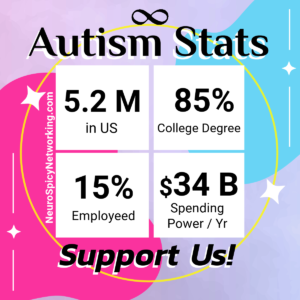Autism is a neurodevelopmental condition that affects communication, interactions, and sensory perceptions of the world. Neurodiversity is a concept that recognizes and respects the diversity of human brains and minds, and includes people with autism, ADHD, dyslexia, and other neurological differences.
According to the latest estimates there are about 5.4 million adults in the United States who have autism spectrum disorder (ASD).
Centers for Disease Control and Prevention (CDC)
Despite being a large and diverse group of people, autistic and neurodivergent adults face many challenges and barriers in finding and maintaining employment and participating in the economy and society at large.
Underdiagnosed and Unsupported
Many autistic people do not receive a diagnosis or appropriate services and supports, which can lead to difficulties and risks, such as social, emotional, educational, and occupational. Changes in definitions, gender bias, racial bias, and unequal healthcare access are factors that can affect the availability and validity of diagnostic tools and assessments, as well as the awareness and understanding of autism among the general public and the scientific community. As a result, many autists are being missed or excluded by the current diagnostic criteria or methods, or we face systemic barriers to seeking or obtaining a diagnosis.
People assigned female at birth (AFAB) with autism are often underdiagnosed, particularly in individuals without an intellectual development disorder. This is because we perform camouflaging, which means we can mimic certain social behaviors in public situations, including at doctor’s offices and in therapy. This can “mask” their autistic traits and make us appear more neurotypical than we are. We face more social pressure, stigma, and discrimination than AMAB (assigned male at birth) with autism, which may make us reluctant to seek diagnosis or disclose our difficulties. We may also have more comorbid conditions, such as depression, anxiety, eating disorders, or ADHD, which overshadow their autism diagnosis. Autists often receive misdiagnoses of other mental disorders instead of autism.
Underdiagnosis in autism can have negative consequences for autistic people and those love us. It can prevent us from accessing the services and supports we need to improve their outcomes and opportunities. It can also deprive us of our identity and sense of belonging in the autistic community.
Educated and Unemployed
Autistic adults who are unemployed or underemployed range from 50% to 85%. This means that only about 15% to 50% of autistic adults have a paid job, and many of us work part-time or in low-skill positions.2
In the US, 2.36 million unemployed autists have a college degree, and yet are unemployed or underemployed.
US. Dept of Labor, Autistic Adults are unemployed, Autism Unemployment Rate
Some of the factors that contribute to the high unemployment rate of autistic adults are:
- Lack of awareness and understanding of autism among employers and co-workers
- Difficulty in finding and applying for jobs that accommodate our sensory needs
- Challenges in navigating the social and communication aspects of workplace culture
- Limited access to support services
These factors not only affect the quality of life and well-being of autistic and neurodivergent adults, but also deprive society and the economy of our potential contributions and innovations. Autistic and neurodivergent people bring unique talents, perspectives, and abilities to the workforce, such as attention to detail, logic, creativity, loyalty, reliability, productivity, and innovation. We excel in tasks that require analytical thinking, problem-solving, pattern recognition, data analysis, coding, design, art, music, and more.
Support Us & We Thrive
It is important to support autistic and neurodivergent adults by offering us supports in the workplace and in business. This can include:
- Raising awareness and education about autism and neurodiversity among employers, co-workers, customers, and the public
- Providing reasonable accommodations and adjustments to suit the needs and preferences of autistic and neurodivergent workers
- Creating inclusive and accessible work environments that foster diversity, equity, and inclusion
- Offering flexible work arrangements, such as remote work, part-time work, or self-employment
- Providing mentoring, coaching, feedback, and guidance to help autistic and neurodivergent workers develop their skills and confidence
- Developing career pathways and opportunities for advancement for autistic and neurodivergent workers, made with input from us
- Encouraging entrepreneurship and innovation among autistic and neurodivergent people
- Supporting organizations and initiatives that promote neurodiversity inclusion in the workplace and in business
By supporting autistic and neurodivergent adults in the workplace and in business, we can be empowered to thrive and achieve our goals. We can also benefit from their diverse perspectives and insights that enrich our society and economy. We can potentially support a huge renaissance of ideas and economic power that can create a more sustainable future for everyone. In making the world more equitable and accessible, we empower marginalized communities to have a voice and a choice.
The spending power of 1.7 million unemployed autistic adults in the US is about $34.8 billion per year.
This is a huge amount of money that can have a significant impact on the economy and society. However, this number does not include all the other neurodivergent people, such as those with ADHD, dyslexia, or other neurological differences. If we include them, the spending power of the neurodiverse population would be even higher.
Not supporting autistic and neurodivergent adults can deprive the society and the economy of their potential contributions and innovations, as well as incur additional costs for health care, education, social services, and welfare. Supporting autistic and neurodivergent adults is not only a matter of social justice, but also a smart economic strategy. It is a win-win situation for everyone involved. We should all take action to make it happen.
Resources:
- Centers for Disease Control and Prevention (CDC)
- US. Dept of Labor, Autistic Adults are unemployed, Autism Unemployment Rate
About the Author
Jesenia, a collaborator with Calling Up Justice and cofounder of One Free Community, is working to build a more equitable and inclusive world via collective action by building communities. Learn more on her Website or Read Jesenia’s Bio.

